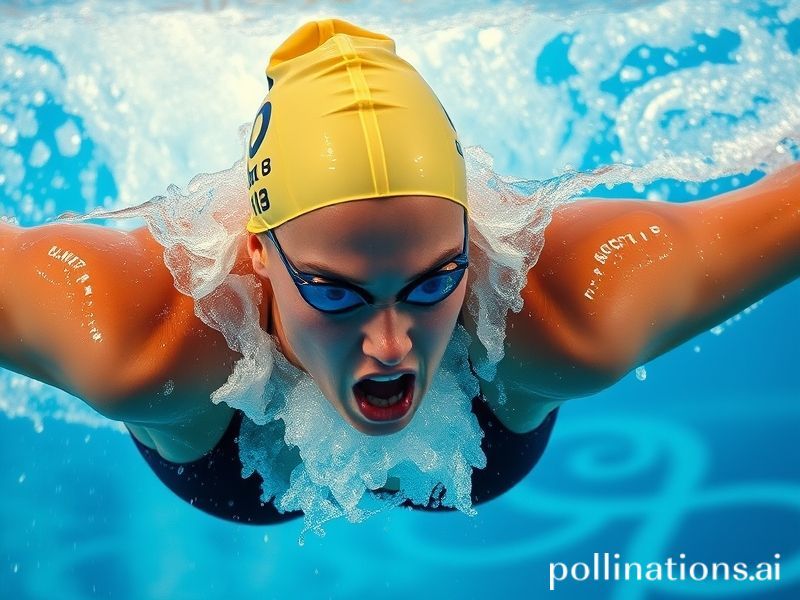Kirsty Coventry Takes the Olympic Reins: A Zimbabwean Lifeguard for a Planet on Fire
Kirsty Coventry, the former Olympic swimmer from land-locked Zimbabwe, has just been elected the first African and first female president of the International Olympic Committee—an outcome that, judging by the collective gasp in Lausanne, landed somewhere between miracle and clerical error. To the outside world this looks like a heart-warming arc: teenage girl dodges crocodiles in the Zambezi, collects seven Olympic medals, and ends up running the five-ring circus. To insiders it looks suspiciously like the IOC finally discovered the continent where most of the world’s youth actually live and decided, with trademark reluctance, to acknowledge its existence.
Let’s be honest: the IOC has long treated Africa the way a Manhattanite treats Brooklyn—close enough to brag about at cocktail parties, far enough to avoid the subway. Coventry’s victory therefore carries the unmistakable whiff of self-preservation. With Paris 2024 still chasing ticket sales and Los Angeles 2028 sounding more like a real-estate pitch than a sporting event, the movement needed a narrative juicier than another European technocrat in a bespoke blazer. Enter a Black woman from a country whose last headline involved inflation rates that looked like telephone numbers.
Globally, Coventry’s elevation is less about swimming lanes than geopolitical fault lines. China, which has spent the past decade buying Olympic soft power one Belt-and-Road stadium at a time, suddenly confronts a president whose home nation still owes Beijing a modest $1.7 billion. The United States, fresh from weaponising human-rights language whenever it suits their medal table, must now toast a woman whose government politely ignores Washington’s travel warnings. And the Gulf petrostates—currently rehearsing “Winter Games in the Desert” for 2034—have to pretend they always adored a sport whose pre-race ritual involves plunging into something resembling, well, water.
Meanwhile, athletes worldwide are calculating the odds that Coventry will actually curb the IOC’s addiction to host cities willing to bankrupt themselves for a fortnight of branded euphoria. Early signs are mixed: she has promised “athlete-centred reform” while simultaneously praising the Tokyo 2020 playbook—a document that read like a dystopian novella in which human beings were reclassified as “stakeholders with limbs.” Expect the usual Olympic compromise: more mental-health apps, fewer actual therapists.
For the Global South, Coventry’s win offers a rare moment of schadenfreude. For decades, Western commentators have treated corruption as an African birthmark, yet the IOC’s own archives read like a Swiss banking version of “How to Steal a Continent in Ten Days.” Having a Zimbabwean at the helm doesn’t magically cleanse the stables, but it does force the moral high ground to relocate to lower altitude. When future host contracts leak—inevitably—they will do so under the gaze of someone who once trained in a pool whose filtration system consisted of praying the municipal pumps stayed awake.
Environmentalists, bless their solar-powered hearts, are cautiously optimistic. Coventry once studied aquatic ecology, which theoretically places her between rising seas and the IOC’s carbon-spewing global torch relay. Expect glossy pledges about “green Games” offset by the logistical reality of flying 11,000 athletes to Brisbane 2032 via the scenic route through Doha. Greta Thunberg has already booked her disapproving stare.
At its core, Coventry’s presidency is a testament to the absurd elasticity of meritocracy: a system that rewards relentless excellence yet still requires the planets of geopolitics, optics, and sheer luck to align. She is not the Messiah; she is, however, a very accomplished backstroker who learned to breathe on both sides while her country learned to breathe through one economic crisis after another. If she can make the IOC slightly less insufferable—say, by downgrading its annual caviar budget to mere foie gras—that will count as epochal progress.
In the end, the world hasn’t handed Kirsty Coventry the keys to utopia. It has handed her a burning dumpster full of five-ringed contradictions and asked her to do the butterfly through the flames. Whether she emerges with medals or merely singed Speedos is the next Olympic saga we’ll all pretend to watch between commercials. Either way, history will note that when the planet needed a lifeguard, it chose the woman who once swam for a country without a coastline. In 2024, that passes for optimism.







